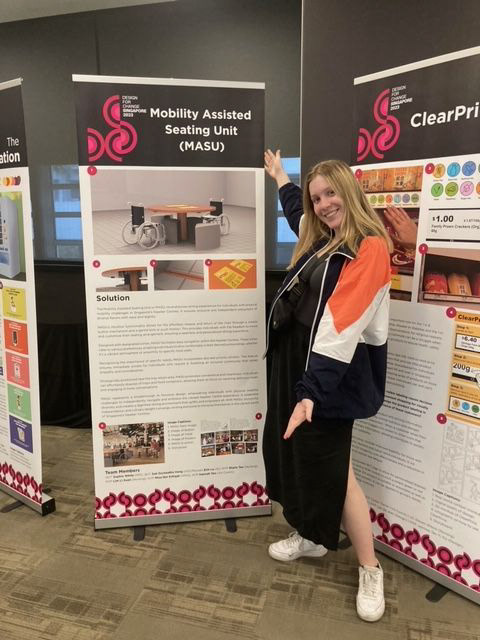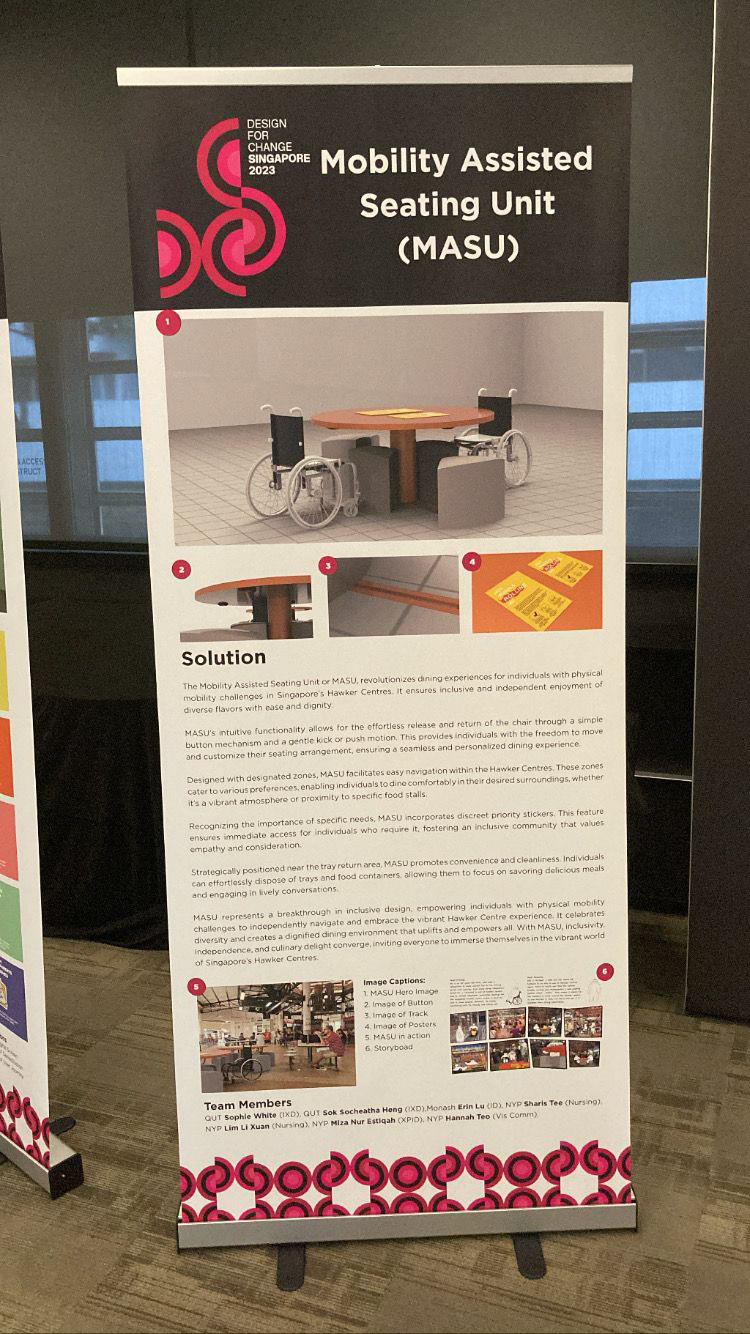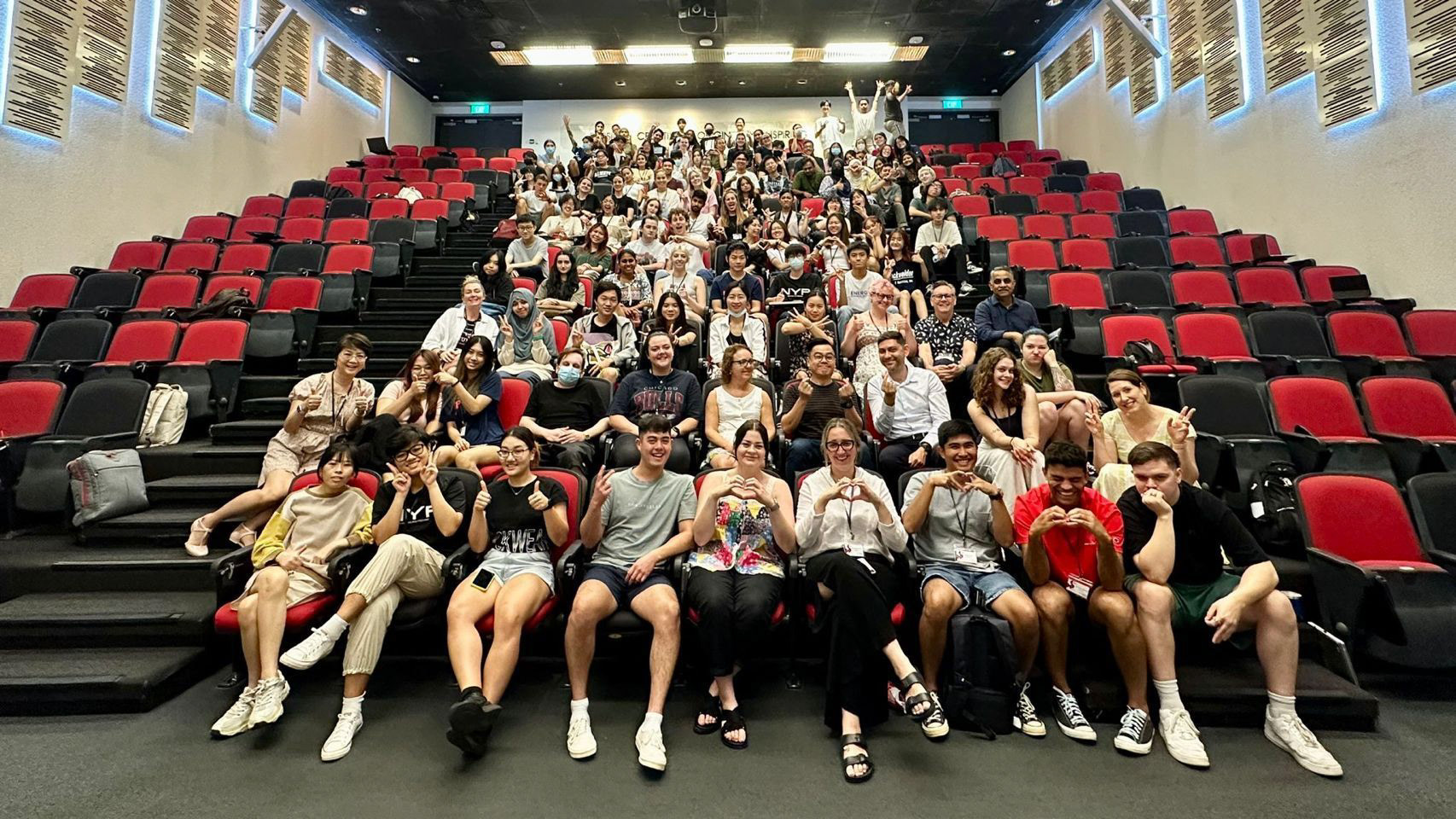Design for Change: Singapore 2023 Experience
I am thrilled to share my incredible experience participating in the Design for Change: Singapore study tour over the past two weeks. This international innovation intensive and exhibition brought together a diverse range of cultural and disciplinary voices, fostering cross-cultural exchange and encouraging students to forge new and creative solutions. I had the privilege of collaborating with a prominent healthcare provider and social enterprise alongside a multidisciplinary group of Design, Media, Business, and Nursing students. Our mission was to research, ideate, and prototype innovative solutions to improve the health of the entire population in Singapore, aligning with the Healthier SG Initiative.
I am proud to announce that our group not only had the opportunity to work on an impactful project, but we also had the honour of winning the Problem Solving Award for our design. Our solution, the Mobility Assisted Seating Unit (MASU), is specifically designed to address the needs of individuals with physical disabilities in Hawker Centres, providing them with enhanced mobility and a personalised dining experience. MASU incorporates intuitive features such as easy chair release and return, ensuring seamless movement. Additionally, designated zones cater to individual preferences, while discreet priority stickers address immediate accessibility needs, fostering empathy and respect. Strategically positioned near the tray return area, MASU enhances convenience and cleanliness. Our ultimate goal is to revolutionise the Hawker Centre experience, promoting inclusivity, independence, and equal access to Singapore's vibrant culinary culture.
I am immensely grateful to QUT for granting me this remarkable opportunity as part of the New Colombo Plan, which allowed me to be part of such a meaningful and impactful project. The Design for Change initiative has not only expanded my horizons but also allowed me to contribute towards creating solutions with the potential for global impact. Winning the Problem Solving Award is a testament to our team's dedication and hard work. I look forward to continuing my journey as a designer and making a positive difference in the world.
My Role in the Project
Research and Brainstorming: In our project, my role began with conducting thorough research and participating in brainstorming sessions to generate innovative ideas. This foundational work was crucial in identifying key issues and potential solutions that would enhance the mobility and dining experience for individuals with physical disabilities in Hawker Centres.
Prototype Development: I was actively involved in developing the final prototype of the Mobility Assisted Seating Unit (MASU). This included working closely with my team to refine the design, test various features, and ensure that our solution was both functional and user-friendly.
Content Creation: In addition to my research and development responsibilities, I also wrote the design solution description for the project banner. This task involved clearly articulating the features and benefits of MASU, as well as explaining how our design addressed the specific needs of our target users.
By combining research, brainstorming, prototype development, and content creation, my role in the Design for Change: Singapore 2023 project was integral to our success. The experience not only honed my skills as a designer but also underscored the importance of empathy and inclusivity in creating impactful solutions.
Solution
The Mobility Assisted Seating Unit or MASU, revolutionizes dining experiences for individuals with physical mobility challenges in Singapore’s Hawker Centres. It ensures inclusive and independent enjoyment of diverse flavors with ease and dignity.
MASU’s intuitive functionality allows for the effortless release and return of the chair through a simple button mechanism and a gentle kick or push motion. This provides individuals with the freedom to move and customize their seating arrangement, ensuring a seamless and personalized dining experience.
Designed with designated zones, MASU facilitates easy navigation within the Hawker Centres. These zones cater to various preferences, enabling individuals to dine comfortably in their desired surroundings, whether it’s a vibrant atmosphere or proximity to specific food stalls.
Recognizing the importance of specific needs, MASU incorporates discreet priority stickers. This feature ensures immediate access for individuals who require it, fostering an inclusive community that values empathy and consideration.
Strategically positioned near the tray return area, MASU promotes convenience and cleanliness. Individuals can effortlessly dispose of trays and food containers, allowing them to focus on savouring delicious meals and engaging in lively conversations.
MASU represents a breakthrough in inclusive design, empowering individuals with physical mobility challenges to independently navigate and embrace the vibrant Hawker Centre experience. It celebrates diversity and creates a dignified dining environment that uplifts and empowers all. With MASU, inclusivity, independence, and culinary delight converge, inviting everyone to immerse themselves in the vibrant world of Singapore’s Hawker Centres.



